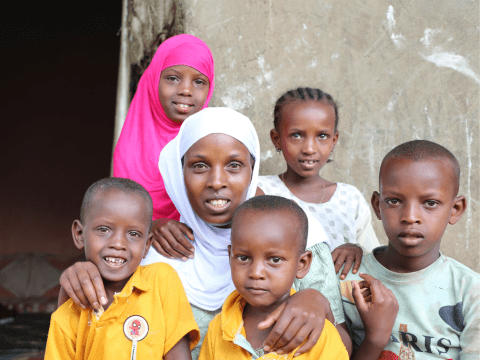Rebuilding a Life, Embracing Hope: The Journey of Angatu

At just 27, Angatu has overcome significant challenges, showing remarkable strength, resilience, and determination. Angatu lives in Habro Woreda, Oromia Regional State, Ethiopia. As a dedicated mother of five, she is determined to break the cycle of poverty and early marriage that she has experienced in order to provide a better future for her children.
Angatu was born the fourth of ten siblings, and her life took a dramatic change when her parents separated. Her mother drove her into marriage when she was 15 years old, despite considerable opposition from her father and his family. Her mother hoped that the marriage would bring stability to their family by reducing the number of mouths to feed, but it soon became evident that Angatu would face years of difficulty.
Angatu's husband was significantly older and unemployed, making her solely responsible for supporting the family, while also being abusive. The couple possessed half a hectare of land and produced Chat, a local cash crop. Over time, her husband's addiction to Chat took a serious toll on his mental health, making living at home dangerous to her family.
Following the birth of her fifth child, Angatu made the difficult decision to leave her husband to avoid the abuse. She left their home with her children and began anew as a single mother, renting a home and working as a day labourer.
"I was doing everything I could to meet my family’s basic needs, but with five children, it was incredibly hard," Angatu says.
In 2021, Angatu enrolled in Ethiopia's flagship social protection scheme, the Productive Safety Net Programme (PSNP), which provides food and monetary assistance to help people like Angatu. The SPIR II project, led by World Vision and implemented with CARE, ORDA Ethiopia, and IFPRI (learning partner), aims to transform livelihoods, build resilience, and improve food security and nutrition for poor rural households targeted by the PSNP to provide food transfers during the lean season to address urgent needs.
Providing food assistance to food-insecure families during the lean season is a vital component of the SPIR II project. This support helps families in meeting their basic food needs while avoiding detrimental coping mechanisms such as selling productive assets. Despite limited income, Angatu works tirelessly to keep her children healthy and well-fed, skillfully using every resource available to her, including food rations.
SPIR II imports roughly 33,000 US tons (30,000 metric tonnes) of food from the United States each year, including sorghum and yellow split pea cultivated by American farmers, as well as fortified vegetable oil produced by American corporations and purchased by SPIR II to help save lives in Ethiopia.
Today, Angatu supplements her income by working on farms and hopes to develop into small-scale trading. She believes that this will give adequate financial support to keep her children in school.
"My biggest dream is for my children to finish their education and live a better life," she aspires. "I do not want them, especially my daughters, to experience the hardships I faced."
Despite the obstacles, Angatu remains determined. She is committed to ensuring that her children have a proper childhood and have access to opportunities that she did not have.
By Emnet Dereje, Communications Specialist (SPIR II), World Vision Ethiopia